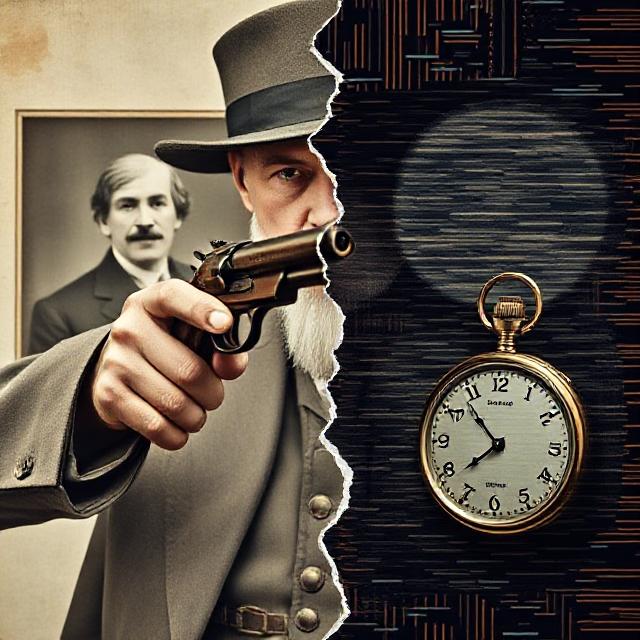Your cart is currently empty!
Grandfather Paradox: Can Time Travel Avoid Contradictions?

Table of Contents
What Is the Grandfather Paradox?
The grandfather paradox is one of the most well-known and perplexing thought experiments about time travel. It presents a scenario in which a person travels back in time and kills their grandfather before their parent is born. This leads to a contradiction: If the grandfather died, the time traveler would never be born—so who went back in time to commit the act?
This paradox is not just an amusing sci-fi puzzle. It forces us to think deeply about the nature of causality, the structure of time, and the limits of human logic. It’s a philosophical riddle that straddles metaphysics, physics, and epistemology. Is time travel into the past inherently impossible, or can some versions of the universe handle this loop?
IUnderstanding the Paradox
At its core, the grandfather paradox is a logical contradiction that arises from self-defeating causal loops.
The Classic Scenario:
- A person travels back in time.
- They kill their grandfather before the traveler’s parent is conceived.
- The traveler is never born.
- If the traveler is never born, they cannot go back in time.
- If they cannot go back in time, the grandfather is never killed.
- The traveler is born.
- Repeat.
This recursive loop is logically incoherent—it suggests that both the grandfather is and is not killed, and that the time traveler both exists and does not exist.
Time Travel and Causality
At the heart of the paradox lies the principle of causality—the idea that causes lead to effects. In normal linear time, events follow a one-way chain of cause and effect.
- Forward causality: Past causes present, which causes future.
- Backward causality: Future influences the past (time travel introduces this).
Backward causality appears to violate the standard rules of logic and physics. If future events can alter the past, then the chain of causality breaks down—or becomes circular in a way that undermines coherence.
Responses to the Grandfather Paradox
Philosophers, physicists, and science fiction writers have proposed several solutions to the grandfather paradox. These can be grouped into four main categories:
1. Time Travel to the Past Is Impossible
One straightforward resolution is that backward time travel simply cannot happen. This view preserves logical coherence by ruling out the very thing that creates the contradiction. The universe, in this view, includes physical laws (like the speed of light barrier or entropy increase) that prohibit retrocausality.
2. Consistency Constraints (Novikov Self-Consistency Principle)
Some theories suggest that the timeline is self-consistent. According to the Novikov self-consistency principle, any actions taken by a time traveler were always part of history.
You may travel to the past, but you cannot change it.
In this model:
- The time traveler may try to kill their grandfather, but something will always stop them.
- Or they may unwittingly become part of the conditions that ensure their own existence.
This allows time travel without contradiction—but eliminates free will.
3. Multiple Timelines or Parallel Universes
Another common solution is the multiverse theory. In this view:
- Killing your grandfather spawns a new timeline where you are never born.
- Your original timeline remains unchanged.
This approach preserves both logical consistency and the ability to alter events—but suggests an infinite number of branching realities.
4. The Block Universe (Eternalism)
According to eternalism, time is like space: all moments (past, present, future) exist simultaneously. You cannot change events because everything is already “written.”
- You can visit the past, but you cannot alter it.
- Free will becomes an illusion—everything that happens must happen.
This view offers a way out of paradox, but at the cost of denying agency.
Implications for Free Will
The grandfather paradox isn’t just about time travel—it’s about whether we control our choices.
- If we can change the past, we defy determinism.
- If we cannot, our lives may be predestined.
Free will vs determinism becomes a hidden theme behind the paradox:
- Is the universe like a movie reel, with everything pre-recorded?
- Or is it like a game, where outcomes vary depending on our decisions?
Time travel becomes a mirror for deeper questions about human freedom.
Pop Culture and the Paradox
The grandfather paradox is a staple of science fiction:
- Back to the Future: Marty McFly risks erasing his existence by interfering with his parents’ past.
- Looper: Time travel is used for crime, but the plot hinges on the consequences of interacting with one’s past self.
- Avengers: Endgame: Introduces multiple timelines to sidestep paradoxes.
Fiction thrives on the emotional and logical tension of the paradox—but often bends the rules for dramatic effect.
Thought Experiments for Reflection
- If you went back in time and left a note for your younger self, would that note change your future?
- Could someone else kill your grandfather, and would that create the same paradox?
- Is the idea of time travel inherently incoherent—or just unfamiliar?
Summary Table
| Solution Approach | Key Idea | Consequence |
|---|---|---|
| No Time Travel | Past cannot be accessed | Avoids contradiction entirely |
| Self-Consistency | Past cannot be changed | Fate is fixed |
| Parallel Timelines | Changes create alternate realities | Infinite versions of history |
| Block Universe | All events are immutable | Free will illusion, no paradox |
TL;DR Summary
- The grandfather paradox reveals the contradictions of changing the past.
- Time travel challenges our ideas about causality, freedom, and identity.
- Possible solutions include self-consistency, multiple timelines, or eternalism.
- Whether time travel is possible or not, it reveals hidden assumptions in how we understand reality.
